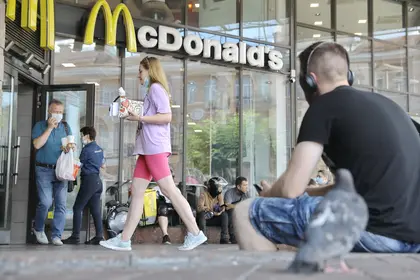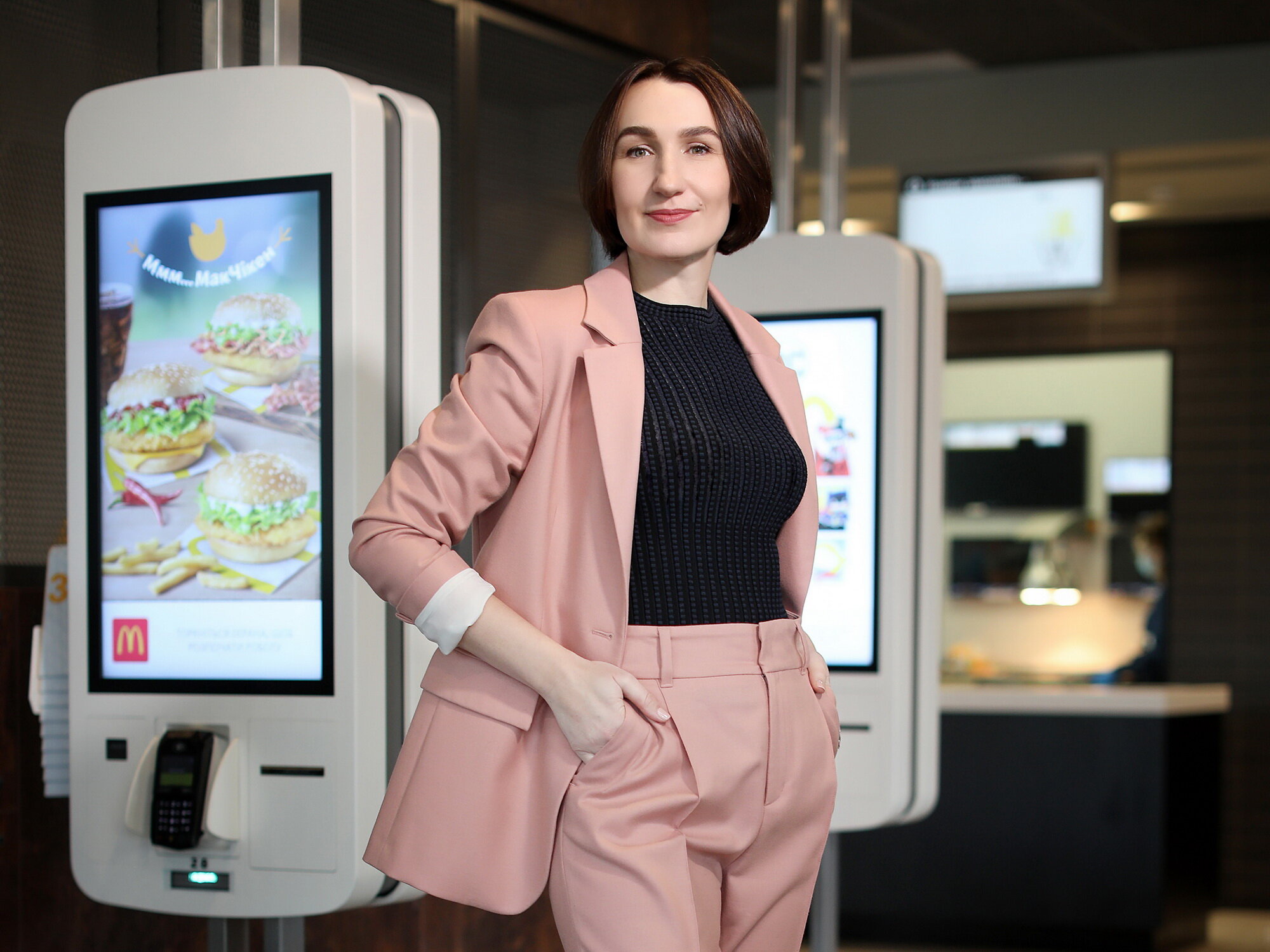For food delivery services to succeed in Ukraine, there is but one unwritten rule to follow: have McDonald’s on the menu. The fast food chain serves 100 million orders annually in Ukraine.
For McDonald’s, deliveries have been a life vest since the pandemic started. The profit of its Ukrainian branches dropped by $12 million last year – to $23 million – as 20% fewer people visited its brick-and-mortar restaurants. But the damage could have been worse if it wasn’t for deliveries.
JOIN US ON TELEGRAM
Follow our coverage of the war on the @Kyivpost_official.
Stepping into the delivery business was a hard decision for McDonald’s that, for over 60 years, had served food inside its restaurants, according to Yuliya Badritdinova, CEO of McDonald’s Ukraine. How could it make sure couriers could keep French fries and burgers warm and fresh?
The company decided to launch delivery services in 2017. Its first partner in Ukraine was the Spanish delivery Glovo, followed by Ukraine-founded Rocket (Raketa). In 2020, these companies helped McDonald’s avoid lay-offs and losses in profit, even allowing it to look towards future growth.
Despite the enduring pandemic, McDonald’s Ukraine has ambitious goals ahead to invest $42 million in new restaurants.
“Many places are waiting for McDonald’s to come,” Badritdinova said.
Working in volatile market
Unlike in the U.S., where over 13,800 McDonald’s restaurants work as franchises, the 101 restaurants in Ukraine are owned by the company. The market is too small and volatile to open franchises, according to Badritdinova. The company also can afford to own all the restaurants.
McDonald’s has invested nearly $300 million in Ukraine since it entered the country in 1997. The company opens three to four restaurants a year and invests $1-2 million in each, expecting to return investments in three to six years.
McDonald’s doesn’t own real estate in Ukraine — it rents buildings located in populated areas, usually at the intersection of the streets, or occupies space in big shopping malls like Ocean Plaza or Blockbuster Mall in Kyiv. Having a separate restaurant with a pickup area for delivery drivers has proved to be more reliable during the pandemic when shopping malls were closed for quarantine, Badritdinova said.
Ukrainian cities want to have at least one McDonald’s, but opening a new restaurant is not easy, especially when it comes to obtaining a license for construction or installing electricity.
“Everything that requires interaction with government agencies is unpredictable and takes a lot of time,” Badritdinova said. “I can’t guarantee a manager in Europe when exactly I will open a restaurant because it often depends on how people feel in the government.”
In the upcoming years, McDonald’s plans to open more restaurants in big cities like Lviv, Odesa, Dnipro, Kharkiv and Kyiv but also in towns like Bila Tserkva, Lutsk and Khmelnytsky. “If only government agencies worked faster and more efficiently, it would be easier to open more restaurants and invest more,” Badritdinova said.
Serving fast food with local flavor
For a Ukrainian brought up on homemade syrnyky, pancakes made of cottage cheese, or potato pancakes deruny, McDonald’s iconic Big Tasty may seem exotic. However, the ingredients for nearly 60% of dishes in local McDonald’s are produced in Ukraine.
Burger buns with sesame seeds, for example, are supplied by Dnipro-based company Bimbo QSR, eggs — by agriculture company Ovostar, milk for the ice cream — by dairy plant BMK and the beef patties are supplied by a factory called OSI Food Solutions in Vinnytsia Oblast.
McDonald’s works with local producers because it is safer and easier than importing, Badritdinova said. For Ukrainian businesses McDonald’s is a big client and a renowned brand. But working with the company is demanding: McDonald’s requires local businesses to prove that they supply high-quality products, pay transparent salaries and follow strict hygiene rules.
If there is no factory in Ukraine that satisfies McDonald’s requirements, the company can ask foreign businesses to start production here. For example, to open a bakery in Dnipro, U.S. Bimbo QSR invested nearly $20 million. Or it can import products like it does with nuggets, chicken patties, potatoes and coffee. A factory in Poland, for instance, supplies the potatoes used to make French fries “for half of Europe,” including Ukraine.
Building brand
McDonald’s is a cultural experience in Ukraine – not cheap fast food. The company’s image is not spoiled by controversies around employee wages, tense relationships with the owners of franchises and staffing shortages like in the U.S.
Many Ukrainian students opt to work in McDonald’s part-time while studying in university because the company offers flexible work hours and pays hourly.
A day-shift employee working 40 hours a week at a McDonald’s restaurant in Kyiv makes nearly $530 before taxes a month, slightly less than an average salary in Kyiv. Although working in McDonald’s is hard, according to Badritdinova, the company supports employee career advancement. Badritdinova herself headed McDonald’s marketing department since 2013 before she was appointed CEO of the whole Ukrainian branch in 2019.
In the Ukrainian fast-food market, McDonald’s doesn’t have big competitors, apart from KFC that entered the country in 2012 and now owns nearly 35 restaurants. The main rival for local fast-food chains is homemade food that is still in vogue in Ukraine, Badritdinova said.
To win the support of local customers, McDonald’s changed the design of its restaurants, introduced more sustainable packaging and plans to invest in plant-based burgers when the demand rises.
The company’s laboratory in Germany analyzes consumers’ tastes and adjusts recipes. There are also cooking tricks McDonald’s uses to prepare its food. French fries, for example, are put into oil before freezing so that they are crunchy when cooked. There are also secret recipes for burger sauces and ice cream that no rival has managed to replicate yet.
One of the company’s main rules is to follow customers’ requests: to change its menu, adding healthier food or indulgent snacks, or to speed up serving. Delivering food is another way to follow clients’ needs in times when more people work from home. “We want to be where our customer is,” Badritdinova said.
You can also highlight the text and press Ctrl + Enter





